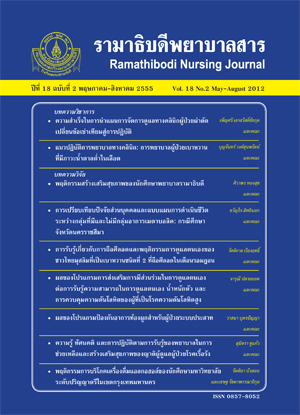การรับรู้เกี่ยวกับการถือศีลอดและพฤติกรรมการดูแลตนเองของชาวไทยมุสลิมที่เป็นเบาหวานชนิดที่ 2 ที่ถือศีลอดในเดือนรอมฎอน
Main Article Content
Abstract
บทคัดย่อ
การวิจัยครั้งนี้เป็นการวิจัยเชิงบรรยาย เพื่อศึกษาการรับรู้เกี่ยวกับการถือศีลอดและ พฤติกรรมการดูแลตนเองของชาวไทยมุสลิมที่เป็นเบาหวานชนิดที่ 2 ที่ถือศีลอดในเดือนรอมฎอน โดยใช้ทฤษฎีการดูแลตนเองของโอเร็มร่วมกับแนวคิดการอธิบายความเจ็บป่วยของไคล์นแมน และคณะเป็นกรอบแนวคิดการวิจัย กลุ่มตัวอย่างซึ่งเลือกกลุ่มตัวอย่างแบบเจาะจง เป็นชาวไทยมุสลิม ที่เป็นเบาหวานชนิดที่ 2 ที่เข้ารับบริการที่คลินิกเบาหวาน แผนกผู้ป่วยนอก โรงพยาบาลปัตตานี จำนวน 52 ราย เก็บข้อมูลโดยการสัมภาษณ์โดยใช้แบบสัมภาษณ์กึ่งโครงสร้างและบันทึกเสียง วิเคราะห์ข้อมูลด้วยสถิติบรรยายและการวิเคราะห์เชิงเนื้อหา ผลการวิจัยพบว่า กลุ่มตัวอย่างส่วนใหญ่ ประมาณ 3 ใน 4 ถือศีลอดในเดือนรอมฎอนได้เต็มเดือน และรับรู้ว่าการถือศีลอดไม่มีความเสี่ยง แต่เป็นประโยชน์ต่อสุขภาพและได้บุญ โดยประเมินความเสี่ยงหรือประโยชน์ของการถือศีลอด จากการได้รับข้อมูลและประสบการณ์เดิม และประเมินความสามารถในการถือศีลอดจากสุขภาพ โดยรวมหรืออาการเจ็บป่วยที่เกิดขึ้น กลุ่มตัวอย่างส่วนใหญ่รับประทานอาหาร 2 มื้อ ได้แก่ มื้อสะฮูร (มื้อเช้า) และมื้อเปิดบวช (มื้อเย็น) ร่วมกับอาหารว่างก่อนนอน โดยรับประทานอาหาร และเครื่องดื่มรสหวานเพิ่มขึ้น และดื่มน้ำน้อยลง ส่วนใหญ่รับประทานยามื้อเช้าช่วงอาหารมื้อสะฮูรยา มื้อเย็นช่วงอาหารมื้อเปิดบวชและงดยามื้อเที่ยง โดยทุกรายใช้ชนิดและขนาดยาเหมือนช่วงปกติ ส่วนใหญ่ใช้ชีวิตหรือประกอบอาชีพใกล้เคียงช่วงปกติ แต่ใช้เวลาส่วนใหญ่ของวันในการประกอบ ศาสนกิจและหลีกเลี่ยงการทำกิจกรรมหนัก กลุ่มตัวอย่างดูแลความสะอาดร่างกายไม่แตกต่าง จากช่วงปกติ ส่วนใหญ่หลีกเลี่ยงการมาตรวจตามแพทย์นัดเพราะเชื่อว่าการเจาะเลือดทำให้เสียศีลอด หรือการเดินทางทำให้รู้สึกเพลียมากขึ้น และพบว่ามากกว่า 1 ใน 3 ของกลุ่มตัวอย่างมีอาการของ ภาวะนํ้าตาลในเลือดตํ่าขณะถือศีลอด ประมาณครึ่งหนึ่งของกลุ่มตัวอย่างไม่ทราบวิธีประเมินอาการ และการจัดการภาวะแทรกซ้อนเฉียบพลัน ผลงานวิจัยครั้งนี้ ทำให้เข้าใจการรับรู้เกี่ยวกับการ ถือศีลอดและพฤติกรรมการดูแลตนเองในช่วงการถือศีลอดของผู้ที่เป็นเบาหวานชนิดที่ 2 และ สามารถนำไปวางแผนการดูแลให้สอดคล้องกับความเชื่อทางศาสนา และแบบแผนการดำเนินชีวิต ตามบริบททางสังคมของชาวไทยมุสลิมที่เป็นเบาหวานได้ดียิ่งขึ้น
คำสำคัญ: การรับรู้เกี่ยวกับการถือศีลอด พฤติกรรมการดูแลตนเอง เบาหวานชนิดที่ 2 ชาวไทยมุสลิม เดือนรอมฎอน
Abstract
This descriptive research was designed to explore perception towards fasting and self-care behaviors of Thai Muslims with type 2 diabetes mellitus during the fasting month of Ramadan. Orem’s Self-Care Theory and Kleinman’s Explanatory Model of Illness were used to guide the study. The sample included 52 Thai Muslims with type 2 diabetes mellitus who received treatment at the outpatient department in Pattani Hospital. Semi-structure interviews and audiotape recording were used to collect the data, which were analyzed using descriptive statistics and content analysis. Results of the study revealed that most participants (78.8%) were able to fast throughout the month and perceived that fasting was not a health risk, but it was a health benefit and boon. They assessed risks or benefits of fasting from prior information and experiences, and assessed their ability to fast from their overall health status at that time. Most of the sample had two meals a day during Ramadan: Sahur (breakfast) and Iftar (dinner), with snacks before bedtime. They ate more sweet food or/and beverages and less drinking water than usual. Most of them took the morning dose of diabetes medications in Sahur meal, evening dose in Iftar meal, and did not take midday dose. All participants used the same type and dose of medications before Ramadan. Most of them carried on their usual daily activities. They spent most of the time doing religious activity, avoiding heavy activity, and taking rests or naps during the day. In general healthcare practices, the sample’s hygienic habits during fasting were not different from usual. Most participants avoided visiting the doctor during the Ramadan month, because they believed that taking blood test would break the fast, and that traveling would worsen their fatigue. Lastly, one-third of the sample had symptoms of hypoglycemia during fasting, and about half of the sample did not know how to assess and manage them. The results of this study would help healthcare personnel understand perception towards Ramadan fasting and self-care behaviors of Thai Muslims with type 2 diabetes, which in turn, could be applied in planning care congruent with their religious beliefs and sociological lifestyles.
Keywords: Perception towards fasting, Self care behaviors, Type 2 diabetes mellitus, Thai Muslims, Fasting month of Ramadan
Article Details
บทความ ข้อมูล เนื้อหา รูปภาพ ฯลฯ ที่ได้รับการตีพิมพ์ในรามาธิบดีพยาบาลสาร ถือเป็นลิขสิทธิ์ของวารสาร หากบุคคลหรือหน่วยงานใดต้องการนำทั้งหมดหรือส่วนหนึ่งส่วนใดไปเผยแพร่หรือเพื่อกระทำการใด ใด จะต้องได้รับอนุญาตเป็นลายลักษณ์อักษรจากรามาธิบดีพยาบาลสารก่อนเท่านั้น


